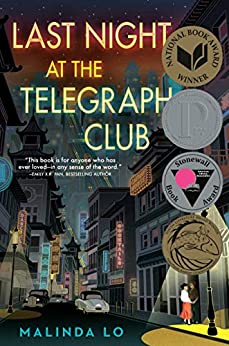 What struck me the most about Last Night at the Telegraph Club was how separate Lily Hu is from the world around her. She is a watcher. She pays attention to the details of what happens around her as she tries to understand who she is in relation to the world. Only when she is with Kath do the details become fuzzy and she fully engages.
What struck me the most about Last Night at the Telegraph Club was how separate Lily Hu is from the world around her. She is a watcher. She pays attention to the details of what happens around her as she tries to understand who she is in relation to the world. Only when she is with Kath do the details become fuzzy and she fully engages.
Towards the end of the book, I thought a lot about a conversation I had with my mother when one of my best friends came out. I was mad at my friend’s mother for being unhappy about her daughter’s orientation, and my mom was explaining that her mother was worried about how difficult her life was going to be as a lesbian. I was frustrated by that without knowing how to explain why that felt wrong. What I understand now is that there is nothing inherently difficult about being a lesbian, or gay. It’s other people who choose to make life difficult. My friend is fine, happily married to her partner of almost 30 years (they met in high school) with a successful career, and of those of us who grew up together, probably the happiest.
Lily’s quiet rebellions and subtle insistence on being herself were a joy to read. She hides pieces of herself from people who won’t appreciate them, but doesn’t let go. She took down the picture of the imagined moon colony, but she never lets go of her interest in math, or in space. When invited to take the easy way out, she hangs on to her hard won truths about herself.
A generous read of Lily’s parents is that they don’t want life to be harder for her, and they can’t imagine that Lily could have a fulfilling life as anything other than a “good Chinese girl.” The interstitials show us that they have not had the lives they planned. And we know that their lives are harder because they are Chinese American. I was left with a hope for Lily that as hard as life might be for her, existing as she does in the intersection of marginalizations, it will also be fulfilling because she has not let go of her whole self.
